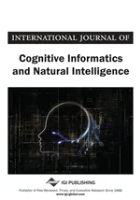
International Journal of Cognitive Informatics and Natural Intelligence
Scope & Guideline
Exploring the Nexus of Mind and Machine
Introduction
Aims and Scopes
- Cognitive Computing and Intelligent Systems:
Research on systems that simulate human cognitive processes, including learning, reasoning, and decision-making, to develop smarter applications. - Machine Learning and Data Analysis:
Focus on algorithms and techniques for analyzing large datasets, including supervised and unsupervised learning, and their applications in various domains. - Human-Computer Interaction (HCI):
Exploration of user experience and interface design, emphasizing how cognitive principles can improve interaction between humans and machines. - Artificial Intelligence Applications:
Investigation of AI technologies in real-world scenarios, aiming to enhance functionality across sectors such as education, healthcare, and environmental monitoring. - Innovative Algorithm Development:
Creation and optimization of novel algorithms for problem-solving in complex environments, including optimization techniques in various computational contexts. - Interdisciplinary Approaches:
Integration of knowledge from cognitive science, psychology, and computer science to foster innovative solutions and theoretical advancements.
Trending and Emerging
- Integration of Virtual Reality (VR) and AI:
Increasing interest in using VR technologies in cognitive applications, particularly for training and educational purposes, showcasing innovative uses of immersive environments. - Multimodal Emotion Recognition:
A growing emphasis on understanding and interpreting emotions through multiple channels (e.g., audio, visual), which is crucial for developing empathetic AI systems. - Optimization Algorithms for Complex Systems:
An uptick in research around advanced optimization algorithms, including those based on swarm intelligence and evolutionary strategies, reflecting the need for efficient problem-solving techniques. - AI in Education:
Exploration of AI technologies to enhance educational models and assessments, particularly in the wake of the pandemic, indicating a shift towards integrating technology in learning environments. - Cognitive Support Tools:
Emerging development of tools designed to assist cognitive processes in various tasks, indicating a blend of cognitive science and practical application in technology. - Cross-Disciplinary Innovations:
Increased collaboration across fields such as neuroscience, psychology, and computer science to address complex problems, highlighting the importance of interdisciplinary research.
Declining or Waning
- Traditional AI Techniques:
Research focused solely on classical AI techniques, such as rule-based systems, has decreased as the field moves towards more adaptive and learning-based approaches. - Basic Data Mining Applications:
Studies that apply standard data mining techniques without integration of advanced cognitive models or machine learning innovations are less prominent. - Theoretical Frameworks Without Practical Applications:
There is a noticeable reduction in purely theoretical papers that do not present practical applications or case studies, as the focus shifts towards actionable insights. - Limited Focus on Conventional Education Methods:
As the journal embraces more innovative teaching models influenced by technology, traditional pedagogical approaches are becoming less frequently discussed. - Single Domain Studies:
Research that focuses narrowly on a single domain without interdisciplinary connections or broader implications is declining in favor of more integrative studies.
Similar Journals
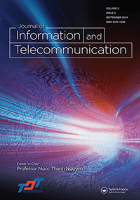
Journal of Information and Telecommunication
Championing Open Access for a Connected Future.Journal of Information and Telecommunication, published by TAYLOR & FRANCIS LTD, is a distinguished open access journal that has been enhancing the global discourse since its establishment in 2017. With an ISSN of 2475-1839 and an E-ISSN of 2475-1847, this journal is located in the United Kingdom and dedicates its focus to the fields of information technology, telecommunications, and related disciplines. Boasting a respectable Q2 quartile ranking across various categories including Computer Networks and Communications, Electrical and Electronic Engineering, and Computer Science Applications in 2023, it ranks notably in the top percentiles of scopus rankings, asserting its significance in the academic community. The journal's commitment to open access since its inception has fostered widespread accessibility, encouraging research dissemination and collaboration on a global scale. By providing a platform for high-quality research, it aims to unite researchers, professionals, and students in their pursuit of innovation and excellence in the ever-evolving digital landscape.

Journal of Advances in Information Technology
Catalyzing Knowledge in Information TechnologyJournal of Advances in Information Technology, published by ENGINEERING & TECHNOLOGY PUBLISHING, is an essential platform for researchers, professionals, and students invested in the dynamic fields of information technology, artificial intelligence, and computer science. With its ISNN of 1798-2340, this journal provides a rigorous peer-reviewed environment that supports the dissemination of innovative research findings, methodologies, and case studies. Since its inception in 2019, it has made notable strides, as reflected in its Q3 quartile rankings across various categories, including Artificial Intelligence and Software, and maintains respectable Scopus rankings, further solidifying its position as a key player in the academic community. Featuring a diverse range of topics within its scope, the journal encourages open access to knowledge while serving as a beacon for those seeking to expand their understanding of current trends and technologies shaping the future. Join us in advancing the field with impactful research that is both relevant and cutting-edge.

IEEE Open Journal of the Computer Society
Empowering Research Through Open AccessIEEE Open Journal of the Computer Society is an esteemed open-access journal dedicated to advancing the field of computer science. Published by IEEE-INST ELECTRICAL ELECTRONICS ENGINEERS INC since 2020, this journal promotes innovative research and scholarly communication in a rapidly evolving technological landscape. With a notable Q1 ranking in the Computer Science (miscellaneous) category and a high Scopus percentile of 92, it serves as a premier platform for disseminating cutting-edge findings and interdisciplinary studies. The journal is committed to facilitating unrestricted access to valuable insights, fostering collaboration among researchers, professionals, and students alike. As it continues to publish impactful articles through 2024 and beyond, the IEEE Open Journal of the Computer Society remains a vital resource for anyone interested in the latest trends and developments in computer science.
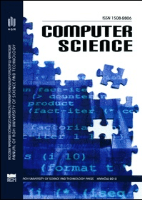
Computer Science-AGH
Pioneering Discoveries in Artificial Intelligence and BeyondComputer Science-AGH, published by the AGH University of Science & Technology Press in Poland, is an esteemed open access journal that has been disseminating high-quality research since 2004. With ISSN 1508-2806 and E-ISSN 2300-7036, this journal focuses on a diverse range of areas within the computer science discipline, including but not limited to Artificial Intelligence, Computational Theory, Computer Graphics, and Networks. While it currently holds a Q4 ranking across several categories as of 2023, it actively promotes research that contributes to the academic community's understanding and evolution in the field. The journal's commitment to open access ensures that vital research is accessible to a wider audience, fostering collaboration and innovation. With its comprehensive focus and strategic publication goals, Computer Science-AGH plays a crucial role in advancing the frontiers of computer science research and education, making it an invaluable resource for researchers, professionals, and students alike.

Cognition Technology & Work
Innovating Insights into Technology and Human ThoughtCognition Technology & Work, published by SPRINGER LONDON LTD, is a premier journal dedicated to exploring the multifaceted interactions between cognitive processes and technological applications in various work environments. With an ISSN of 1435-5558 and an E-ISSN of 1435-5566, this journal has established itself as a critical resource for scholars and practitioners in the fields of Computer Science, Human-Computer Interaction, and Philosophy. Evaluated in the 2023 Journal Citation Reports, it holds impressive category quartiles, ranking Q2 in Computer Science Applications and Human-Computer Interaction, and Q1 in Philosophy, highlighting its significant impact in academic discourse. Furthermore, its Scopus rankings showcase its robust standing, particularly within the Arts and Humanities and Computer Science sectors. Adopting a rigorous peer-review process, the journal aims to foster scholarly communication and advancement in the understanding of cognitive influences on technology in the workplace. It serves as an essential platform for researchers, professionals, and students alike, providing insight into innovative methodologies and theoretical frameworks that shape the future of cognitive technology in work settings.

Frontiers of Computer Science
Pioneering Research for Tomorrow's TechnologyFrontiers of Computer Science is a leading peer-reviewed journal dedicated to advancing the field of computer science through the publication of high-quality research articles, reviews, and theoretical discussions. Published by HIGHER EDUCATION PRESS, this journal has gained significant recognition, currently boasting a prestigious impact factor and ranking in the Q1 quartile for both Computer Science (miscellaneous) and Theoretical Computer Science categories in 2023. With a focus on the intersection of computational theory and practical applications, it serves as a vital platform for researchers, professionals, and students alike who are eager to contribute to and stay updated with groundbreaking developments. The journal’s scope encompasses a wide range of topics, reflecting the diverse nature of computer science today. Operating from Beijing, China, it emphasizes Open Access, ensuring that vital research is readily available to the global academic community. With its convergence period spanning from 2013 to 2024, Frontiers of Computer Science remains committed to fostering innovation and scholarly dialogue that drives the future of technology.
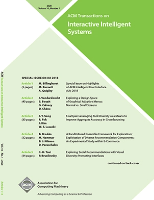
ACM Transactions on Interactive Intelligent Systems
Innovating Tomorrow's Interactive Intelligent Systems Today.ACM Transactions on Interactive Intelligent Systems is a distinguished journal published by the Association for Computing Machinery (ACM), specializing in the realms of Artificial Intelligence and Human-Computer Interaction. With an impactful presence in the academic community, it boasts a respectable Q2 quartile ranking in both fields as of 2023, highlighting its significant contributions to advancing interactive intelligent systems. The journal, identified by ISSN 2160-6455 and E-ISSN 2160-6463, encompasses a broad spectrum of research from theoretical advancements to practical implementations, offering invaluable insights for researchers, professionals, and students. The journal not only serves as a platform for innovative ideas and methodologies but also emphasizes the importance of interdisciplinary approaches in its publications. Positioned in the United States, at 1601 Broadway, 10th Floor, NEW YORK, NY 10019-7434, it stands out for its commitment to quality, rigor, and relevance within the computing and interactive systems sectors.

CONNECTION SCIENCE
Exploring Innovative Connections in Technology and ResearchCONNECTION SCIENCE, published by Taylor & Francis Ltd, is a premier open-access journal in the fields of Artificial Intelligence, Human-Computer Interaction, and Software Engineering, with an impressive history dating back to 1989. With an aim to foster innovative research and breakthroughs, this journal serves as a vital platform for scholars and practitioners seeking to publish and disseminate their findings. As of 2023, CONNECTION SCIENCE proudly holds a Q2 ranking in all three categories, reflecting its significance and influence within the academic community, supported further by robust Scopus rankings placing it in top percentiles across the disciplines. In addition to its extensive service to the global research community, it has transitioned to open access since 2022, enhancing the accessibility of high-impact research to a wider audience. For anyone involved in these dynamic fields, CONNECTION SCIENCE is crucial for keeping up with trends, theories, and practical applications that drive the future of technology and artificial intelligence.

Visual Informatics
Empowering Insights in Human-Computer InteractionVisual Informatics is a premier academic journal published by Elsevier, dedicated to advancing the fields of computer graphics, computer-aided design, and human-computer interaction. Since its launch in 2017, this Open Access journal has swiftly established itself as a leading platform for innovative research, reflected in its impressive impact factor and robust rankings in various Scopus categories. In 2023, it proudly holds positions in the top quartile (Q1) for Computer Graphics and Computer-Aided Design, Human-Computer Interaction, and Software, showcasing its influential contributions to these dynamic fields. Based in Amsterdam, Netherlands, Visual Informatics encourages the dissemination of high-quality, peer-reviewed articles that explore the intersection of visual technology and user experience, serving as an invaluable resource for researchers, professionals, and students seeking to stay at the forefront of these evolving disciplines.
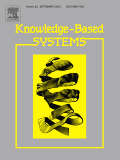
KNOWLEDGE-BASED SYSTEMS
Elevating Knowledge Through Cutting-Edge Research and ApplicationsKNOWLEDGE-BASED SYSTEMS, published by ELSEVIER, is a leading international journal that has established itself as a cornerstone in the fields of Artificial Intelligence, Information Systems and Management, and Software Development. With an impressive track record of over 35 years in publication, this journal is highly regarded for its significant contributions to the understanding and advancement of intelligent systems, providing a platform for innovative research and applications. It boasts a strong impact factor, maintaining a Q1 ranking across multiple categories, including Management Information Systems and Decision Sciences, reflecting its prestige and relevance in the academic community. Researchers and practitioners alike benefit from access to high-quality, peer-reviewed articles that explore the intersection of knowledge management and transformative technologies. The journal's commitment to fostering interdisciplinary research encourages the dissemination of knowledge that shapes the future of intelligent decision-making processes. With a substantial audience that includes professionals, academics, and students, KNOWLEDGE-BASED SYSTEMS continues to be a vital resource for those at the frontier of technological advancement.